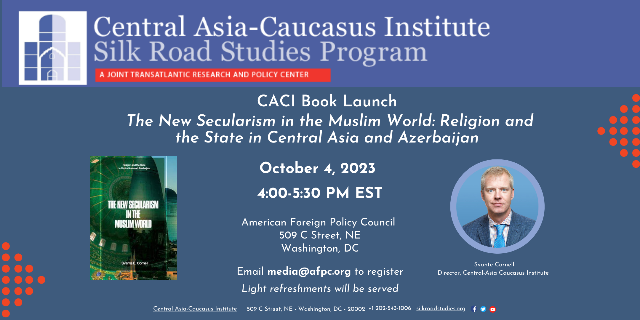New Initiatives from Kyrgyzstan
On January 29, 2025, the Central Asia-Caucasus Institute at the American Foreign Policy Council and the Times of Central Asia hosted a webinar "New Initiatives from Kyrgyzstan" on the evolving bilateral relationship between the United States and Kyrgyzstan. Dr. S. Frederick Starr, Chairman of the Central Asia-Caucasus Institute at the American Foreign Policy Council, led a panel of experts. The discussion focused on economic cooperation, security, cultural and educational exchanges, and both countries' commitment to democratic values. Together, they explored Kyrgyzstan's diplomatic milestones, economic collaborations, and its rising profile in Central Asia. The discussion emphasized the strengthening ties between the two countries and their joint efforts to promote growth and stability in Central Asia. A recording of the full webinar is available on YouTube.
Kyrgyzstan is the second least populated country in Central Asia and has played a significant role in the region since gaining independence. It pioneered a bold parliamentary system of government and has worked diligently to make this system effective.
In the discussion, it was noted that the current president of Kyrgyzstan, Sadyr Zhaparov, is very active on all fronts. While he has transformed the country's governance to a presidential system, democratic processes continue with regular elections and pre-election campaigns.
As noted by Dr. Starr, President Zhaparov has successfully addressed important resource-related issues in the country. He fulfilled his promise to return the Kumtor mine to Kyrgyz ownership. He has also taken significant initiatives regarding water resources, overseeing various dams and power plants that are either operational or in development.
"A great credit to President Zhaparov is his efforts to fight corruption," states Dr. Starr.
Transportation is another key area of Zhaparov's work. He has actively advanced the China-Kyrgyzstan-Uzbekistan railway project. Under his leadership, Kyrgyzstan has accelerated bilateral negotiations and pushed forward the project's implementation - a significant step that previous administrations had not achieved. Dr. Starr also highlighted Zhaparov's success in bridging the historical divide between the country's northern and southern regions through new transportation infrastructure. His presidency has seen the opening of airports in both regions, along with new road networks that have better integrated the country than ever before. The President has made significant progress in reducing the traditional north-south rivalry and confrontation that has historically hindered Kyrgyzstan's development. These improvements have created new opportunities for development in the south, particularly in the Ferghana Valley region.
Watch the video of the event below.
Watch: 4/23 Rumsfeld CAMCA Spring '24 Fellows Presentation: Advancing Digital Interconnectivity in CAMCA Region
A presentation by the Spring 2024 CAMCA Fellows, focusing on the advancement of digital connectivity in Central Asia, Mongolia, the Caucasus, and Afghanistan. In the interconnected landscape of the CAMCA region, digital connectivity serves as a cornerstone for both economic prosperity and social progress. This event is not merely about enhancing digital infrastructure; it's about fostering deeper connections across the region. The Fellows will delve into how overcoming challenges is crucial for unlocking economic potential, ensuring equitable access, and driving regional integrati
Register for the 2024 CAMCA Conference - June 12-13 - Bishkek, Kyrgyzstan
Register for the annual Central Asia - Mongolia - Caucasus - Afghansitan (CAMCA) Regional Forum scheduled for June 12-13 in Bishkek, Kyrgyzstan. The CAMCA Regional Forum is a non-political and non-partisan Forum established to promote region-wide discussions on means of advancing economic growth and development in the 10 countries of the region: Afghanistan, Armenia, Azerbaijan, Georgia, Kazakhstan, Kyrgyzstan, Mongolia, Tajikistan, Turkmenistan and Uzbekistan. It promotes this goal by fostering dialogue and interaction among rising young leaders from all sectors in the 10 countries of the region, as well as with international leaders and stakeholders. The Forum organizers - the CAMCA Network, Central Asia-Caucasus Institute and the Rumsfeld Foundation - believe that expanded communication and collaboration among talented professionals from a range of fields can significantly contribute to economic, political and social development on both a national and regional basis.
The Forum is a premier opportunity to engage with prominent influencers and leaders in the CAMCA region and to gain firsthand insights on the region’s pulse and latest developments. The Forum’s non-political and non-partisan mission facilitates an environment for open conversation aimed toward the prosperity of the region and its people. The Forum was established as one of the first and only platforms to bring together representatives of the 10 CAMCA countries, spanning from the South Caucasus to Mongolia, to discuss emerging opportunities for regional cooperation and integration. Due to the diverse and impressive pool of participants, the Forum essentially serves as a ‘one-stop shop’ for professionals of all sectors who are interested in regional cooperation and partnerships, as well as for outside nations, businesses and organizations that have an interest in engaging with the region.
Click here for more information and to register.
Watch the fall 2023 Rumsfeld Foundation Fellows' Hybrid Forum, "United We Thrive, Divided We Fall"
10/4 CACI Book Launch: The New Secularism in the Muslim World: Religion and the State in Central Asia and Azerbaijan

Across the Muslim world, religion and politics have become increasingly mixed in the past century, with devastating consequences. But there are signs that the ascendancy of political Islam may be coming to an end. In this context, the experience of Central Asia and Azerbaijan as Muslim-majority states that insist on secular laws, courts and education is a much-overlooked model that is bound to attract greater interest. THE NEW SECULARISM is the first study of the Central Asian model in the realm of the interaction of religion and the state, which examines its characteristics as well as how it relates to other frequently touted models in the Muslim world
Join us for the book launch and a discussion of CACI director Svante Cornell's "The New Secularism in the Muslim World: Religion and the State in Central Asia and Azerbaijan."
WHEN: October 4, 2023 4:00-5:30 PM
WHERE: American Foreign Policy Council - 509 C Street, NE, Washington, DC 20002

